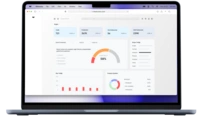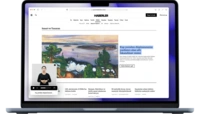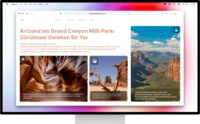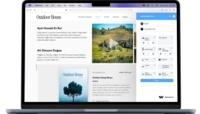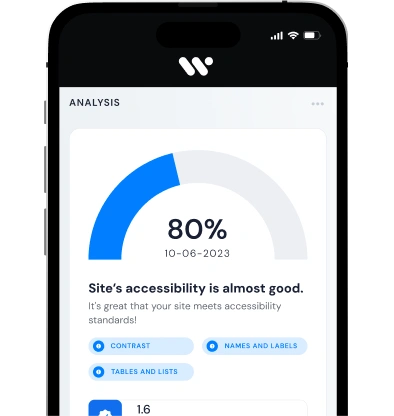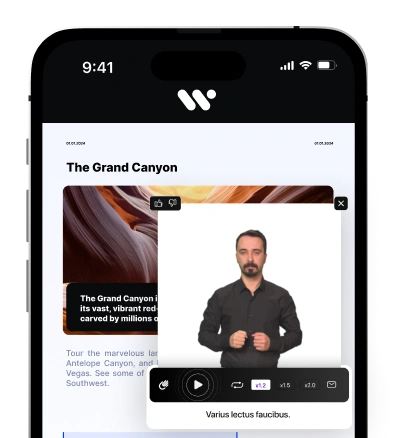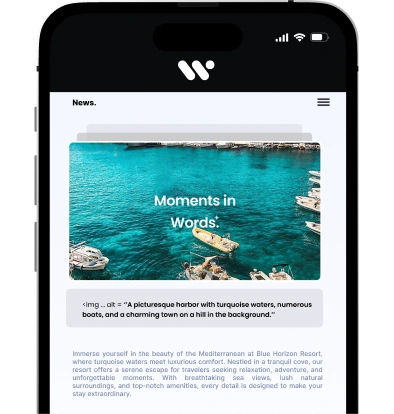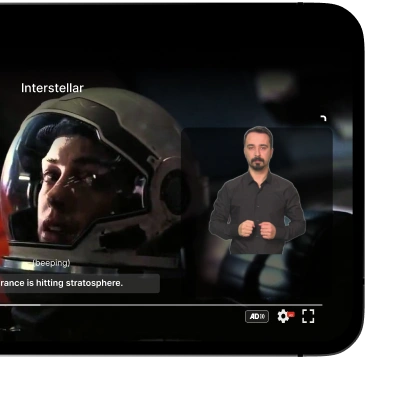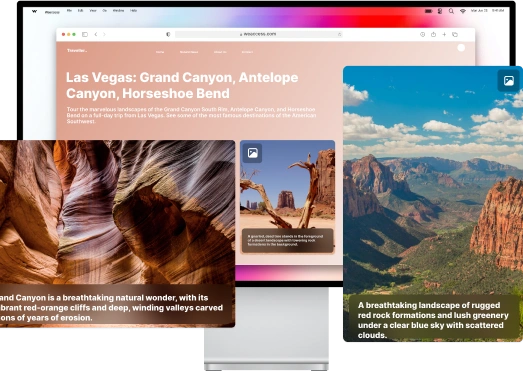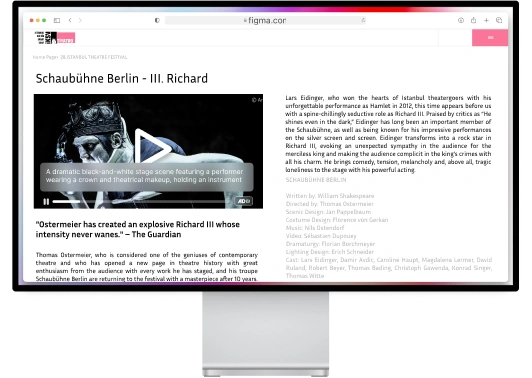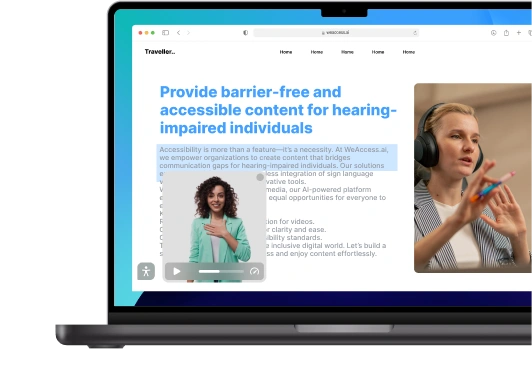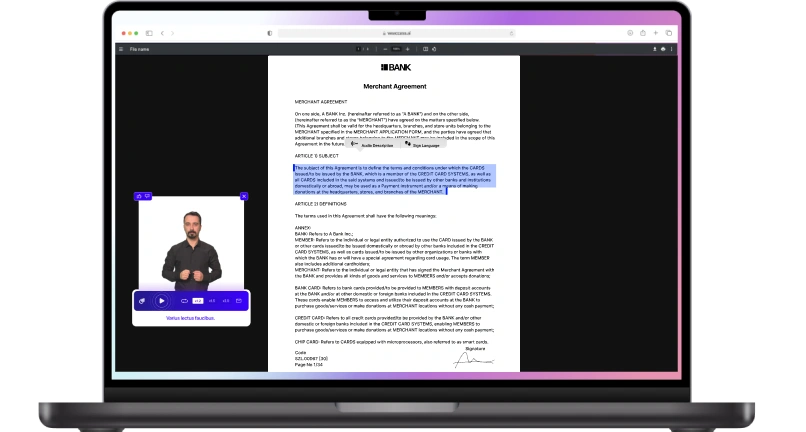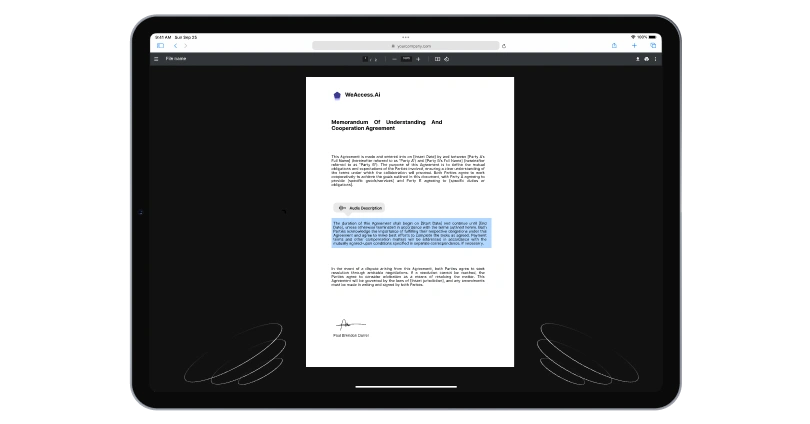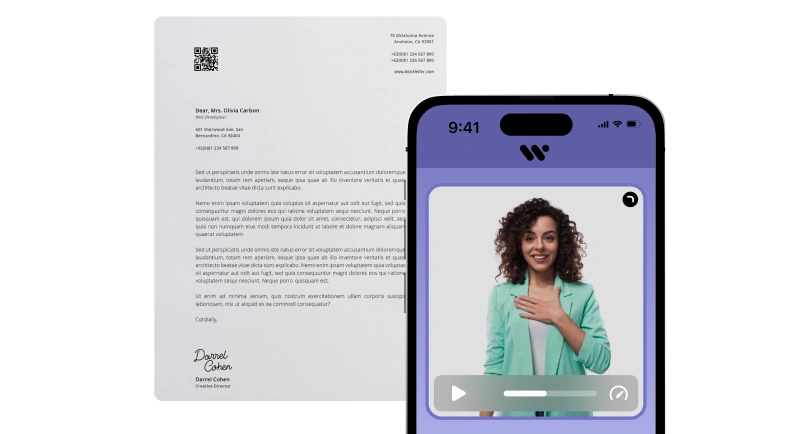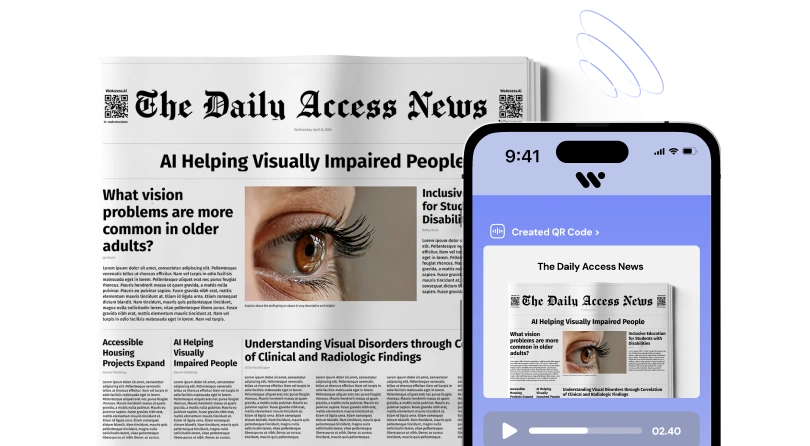In life, things you never expected can bring you unexpected success. This is true in your daily life as well as in your professional life. In other words, a decision you make for your company, which you think is simple, can make you stand out from other companies you compete with in the same field.
That's why it's worthwhile to look at every detail of your startup, whether simple or difficult, that will make you stand out from your competitors. This includes the user experience you offer on your website or mobile app. In fact, if people don't like the design of your website or don't find it useful, they're more likely to give other alternatives a chance. This will greatly hinder your ability to stand out from your competitors. Again, if your mobile app does not come with an optimized design and constantly causes problems, people will prefer to find what they are looking for through your other competitors.
This is exactly the same for visually impaired people, in fact, it would not be wrong to say for all disabled people. If visually impaired users notice a problem with accessibility when they visit a website, they will continue to search for a different web page where they can get a better experience. Wouldn't you like to be the owner of that great website that they reach after all this research, that makes them feel valued, that is designed accessible in every way? And this will seriously differentiate you from your competitors who do not pay due attention to digital accessibility.
In this article, we will take a closer look at digital accessibility and competitiveness. By the end of the content, you will understand how digital accessibility can make you stand out from your competitors, learn how to differentiate yourself in the market with digital accessibility and get to know our digital accessibility solutions that will guide you in this regard. Let's get started.
Accessibility Needs of Users with Disabilities
Just as a first-time user of your website or mobile app looks for things like usability and the ability to get the job done in the shortest time and with the best efficiency, a disabled user who visits your platform in one of these ways will look for similar criteria, but in a slightly different way.
When an ordinary person browses your website, they look at the design, whether they can easily find what they are looking for and many other details. A visually impaired user will look at how they can use the website with screen reader software. If you can't provide a visual experience and a useful design on your website that will delight customers, you're likely to lose that lead. The situation is similar for people with visual or hearing impairments. For example, if your website does not meet WCAG 2.1 standards for a visually impaired user and has extraordinary accessibility issues, the visually impaired person who visits your site will walk away from you after a bad experience and continue their search for what they are looking for on other platforms that offer a more accessible experience.
Visually impaired users use screen reader software on many of their devices, such as smartphones and computers. This software allows them to access everything, but only if everything is designed for them to read. Unlabeled buttons, no link shortcuts to facilitate page navigation, images without alt text and much more will prevent you from providing an accessible experience on your website.
Everyone has the right to access information, a product they want to buy and much more. It is only possible for people with disabilities to exercise their right to access information in a healthy way with websites and mobile applications designed with an inclusive approach.
Therefore, of course, accessibility is an important tool to make you stand out from the competition, but it should be implemented not only to achieve commercial success, but also by considering the accessibility needs of users with disabilities.
Digital Accessibility and Business Competitiveness
Is your goal to have one of the strongest e-commerce platforms in Turkey? Or do you have an initiative that aims to go beyond the borders of Turkey and provide services worldwide? Whatever your goal, you need a good user experience design process to reach the end user. If your target audience is experiencing interface-based bugs, stability issues or various other problems with your website or mobile app, it will make it difficult for you to become a global startup.
On the other hand, are there only people in the world who use an app or website because it has a good design? Have you ever thought about how individuals with different needs can benefit from your services? If you haven't, your competitors who offer an end-to-end inclusive, digitally accessible experience have already surpassed you.
Digital accessibility and competitiveness may seem like different topics, but they are actually very much related. If you want to gain new customers, stand out in the market you compete in, and much more, you should pay attention to digital accessibility. There are over 200 million visually impaired people in the world and no company or startup with big dreams should ignore any customer group.
It doesn't matter if you are a local company aiming to rise in Turkey or a global company aiming to be recognized all over the world. If you can't deliver an end-to-end accessible experience across your digital platforms, you could lose a lot of customers.
Digital Accessibility to Attract New Customers
Let's say you own an e-commerce platform, what do you do to get more customers? First of all, you can start by examining what kind of experience you offer users on your website or mobile app. Can visitors easily find what they are looking for on your website or mobile app? Does the user interface appeal to people's general sense of design taste?
For these questions and more, you can review your platform and improve where you see gaps. This way, no matter from which device a prospect enters your e-commerce platform, they will have a unique experience. However, there is an important issue that many companies overlook in the user experience design process today accessibility. Yes, your website or app may have a very modern look, and many of your customers may prefer to shop on your platform because of its ease of use. But can you offer the same experience for a visually impaired prospective customer?
If you do the necessary work for digital accessibility on your website or mobile app, you could potentially gain millions of visually impaired customers. When a visually impaired or partially sighted person visits your website or mobile app, they will prefer to buy products from you if all menus are designed for their use and keyboard shortcuts or finger gestures for touch devices can be easily used.
At the same time, he/she will share his/her positive experience with his/her visually impaired friends and other people around him/her, and they will prefer you for their next purchases. In this way, you can gain dozens of customers in a short time.
Startups aiming for great success in the long run should care about every customer group. This is why digital accessibility is so important for attracting new customers. Pay attention to digital accessibility to get into more people's pockets and earn more.
Digital Accessibility to Attract New Customers
Let's say you own an e-commerce platform, what do you do to get more customers? First of all, you can start by examining what kind of experience you offer users on your website or mobile app. Can visitors easily find what they are looking for on your website or mobile app? Does the user interface appeal to people's general sense of design taste?
For these questions and more, you can review your platform and improve where you see gaps. This way, no matter from which device a prospect enters your e-commerce platform, they will have a unique experience. However, there is an important issue that many companies overlook in the user experience design process today accessibility. Yes, your website or app may have a very modern look, and many of your customers may prefer to shop on your platform because of its ease of use. But can you offer the same experience for a visually impaired prospective customer?
If you do the necessary work for digital accessibility on your website or mobile app, you could potentially gain millions of visually impaired customers. When a visually impaired or partially sighted person visits your website or mobile app, they will prefer to buy products from you if all menus are designed for their use and keyboard shortcuts or finger gestures for touch devices can be easily used.
At the same time, he/she will share his/her positive experience with his/her visually impaired friends and other people around him/her, and they will prefer you for their next purchases. In this way, you can gain dozens of customers in a short time.
Startups aiming for great success in the long run should care about every customer group. This is why digital accessibility is so important for attracting new customers. Pay attention to digital accessibility to get into more people's pockets and earn more.
Digital Accessibility to Stand Out in the Market
Nowadays, you can find websites and mobile apps that are highly preferred by people simply because they offer a good user experience. Users now want to see a proper design even on websites where they read news. In the same way, individuals prefer to use the design that is most suitable for them in the applications where they read news and do their banking transactions.
Yes, which website or mobile app has a better design may vary from person to person, but there are common criteria that will ensure that an app is loved by the majority of people. That's why, from time to time, you can see that one of the 2 apps doing the same job is downloaded 10 times more than the other, and even if it's not downloaded more, it gets thousands of positive comments compared to its competitors. So why didn't the rival app achieve this success? Or why did the users who preferred that app shower the developer with negative comments? The answer is very simple, poor user experience design.
Accessibility is one of the most important aspects of a good user experience design. A visually impaired or partially sighted user chooses an application based on accessibility needs and does not prefer websites or mobile applications that cannot offer the experience they want. While there are too many mobile applications or websites that offer a negative experience for disabled users, wouldn't you like to be one step ahead of them with an accessible experience? Here, digital accessibility is very important to stand out in the market because you are doing something that perhaps most of your competitors are not doing.
In the market you are competing in, it is very important to analyze the shortcomings of your competitors and take part in the competitive arena with a platform without these shortcomings. We are sure that you are also analyzing your competitors on many issues. However, you should also include accessibility in your review criteria. If your competitors cannot offer an accessible experience for users with disabilities, you can design your website or application in an accessible way so that citizens with disabilities can experience this experience and get ahead of your competitors.
If you make an accessible experience a standard workflow of your user experience design process and maintain it under all circumstances, you will always be ahead of your competitors. Because websites or mobile apps that already offer an accessible experience can lose these qualities with updates over time. For example, refreshing the interface of a mobile app can result in a loss of accessibility.
If you permanently incorporate accessibility into your UX process, you will continue to provide an inclusive experience for everyone, even with a possible interface or website/mobile app internal design change, as accessibility will be part of the design process. This will always put you one step ahead of your competitors.
Digital Accessibility Solutions
By this point, we think you've realized a lot about digital accessibility and competitiveness. If you're still reading this, we're sure you're wondering how to ensure an end-to-end digitally accessible experience on your platform. Let's take a look at the solutions that ensure digital accessibility.
Website Accessibility Improvements
If you want to provide an accessible experience on your website, you are in the right place. First of all, I want to tell you about the AI-based accessibility tools that WeAccess.Ai offers.
- WeAnaylse: If you have no idea about the accessibility of your website and don't know where to start, WeAccess.Ai's WeAnaylse tool can help you. When you enter your website URL into WeAnaylse, our AI-powered tool will scan your website for you and show you accessibility issues in detail. Moreover, your first page analysis is on us! You can solve the accessibility problems on your site according to the report you receive from WeAnaylse.
- WeTool: With WeTool from WeAccess.Ai, solving accessibility problems on your website is as easy as learning about them. By integrating WeTool into your site, you can easily solve accessibility problems on your website with artificial intelligence. After analyzing the accessibility problems on your site, WeTool will solve these problems for you, without you having to take any action. Moreover, you can configure WeTool the way you want.
- In addition to the services offered by WeAccess.Ai, there are also ways to implement accessibility criteria in the design and coding of a website. For example:
- If you are working with an external web design company, you can ask them to design an accessible website.
- If you are doing the website design in-house, you should organize the web design process to include accessibility.
- Web design applications, such as Adobe XD, offer various tools to make accessibility easier to implement. By using these tools, the accessible website design process can be carried out more easily.
- An accessible website design can be completed by considering the necessary criteria in the coding process. If you follow all these points, you will open the doors to an accessible experience on your website.
Mobile Application Accessibility Improvements
Mobile application accessibility is very important for visually impaired individuals using Android and iOS devices. In order for visually impaired people to comfortably use a mobile application with Voice Over on iOS and TalkBack screen reader software on Android, many details, especially the user interface, should be taken into consideration. Similar to website design, the tools that enable mobile application design also offer various tools to make the design process more accessible. The developer tools and help content provided by Apple and Google also include more details on this topic.
Social Media and Digital Marketing Accessibility Strategies
While the accessibility of your website and mobile apps is very important, you can also apply accessibility to the posts you share on Facebook, Twitter, Instagram and LinkedIn. These platforms are designed to be accessible and offer some convenience to their users, but for an inclusive experience, it would make more sense for your company to pay attention to this issue. For this purpose:
- If you are sharing a photo on Facebook, Twitter, Instagram or LinkedIn, you can make it easier for visually impaired social media users to understand what is in the photo by adding alt text to the photo in the editing section that appears after uploading the photo to the relevant platform.
- Adding alt text to images on platforms such as Instagram may not be enough to explain the image. For this, you can add the visual description/explanation as text at the bottom of the post.
- In the digital marketing process, it is important to draw attention to accessibility in the advertisements. For this purpose, ad images can be tagged and more details can be included in ad texts.
Advantages and Impacts of Digital Accessibility Practices
-
We've seen why digital accessibility can be important for competition, we've looked at how we can ensure an accessible experience on our website or mobile app, and now the next question is, what are the benefits and impacts of digital accessibility practices? Increased Customer Satisfaction Providing an accessible experience on your website or mobile app will help you get positive feedback from customers with disabilities who choose you. People will compare your experience with your competitors and tell you why they prefer you. This feedback increases the likelihood that you will be preferred by both the visually impaired and other customers.
-
Strengthening Business Image Paying attention to accessibility can also go a long way in strengthening your business image. As this experience spreads among people, the number of people who think that your company always cares about this issue will increase. Anyone who knows you as a "company with responsive policies" will spread the word and help strengthen your brand image.
-
In addition, publicizing the importance you attach to this issue in the right way, supporting it with more concrete work and many other factors can also contribute to this. Because with responsive policies, you attract the attention of not only visually impaired individuals but also many parts of the society, and responsive citizens will have positive opinions about you. This strengthens your business image.
Digital Accessibility and Sustainability
-
Ensuring digital accessibility alone is not enough. It is also very important that this process is continuous and sustainable. If there is no separate unit within your company that works on accessibility and your platform can only offer an accessible experience after negative feedback from disabled customers, we cannot say that accessibility will be permanent on that platform.
-
Unfortunately, most websites and mobile applications today provide digital accessibility with policies that save the day and this leads to serious problems in the following processes. A new menu or tab added to the platform may not be accessible, the accessible experience may become problematic in the slightest interface improvement. Or, due to incomplete accessibility work, a website or mobile application, even if it is relatively accessible, may become difficult to use by visually impaired users.
-
It is very important that accessibility is sustainable to avoid these problems. By really caring about accessibility, you can give a good response to dozens of competitors who do not do the necessary work for digital accessibility or implement policies that only save the day.
-
Your policies can inspire your competitors and make them pay attention to digital accessibility as well. In this way, you're pioneering a good step forward. Ultimately, to stay ahead of the competition, make digital accessibility a permanent part of your user experience design process.
Integrating Digital Accessibility Practices into Business Processes
In order for digital accessibility to be sustainable, it is very important to carry out integration studies on this issue within the enterprise. Digital accessibility can only become permanently possible with a group of employees who are aware of this issue. There are 2 important stages for this integration process.
Team Awareness and Training
In-team awareness and training is an important process within the company, spanning software development, user experience design and even the customer service team. All employees need to be informed about what accessibility and digital accessibility is and why it is important, as well as understanding its importance for users with disabilities.
This training process should cover both the technical and communication side of the business. For example, when a visually impaired user communicates a problem with your website via email, phone call or live support, the agent dealing with the customer should be aware of what accessibility is and provide a satisfactory answer. After the conversation, the agent should escalate the issue to the software development and user experience team and follow the resolution process.If the software development and user experience teams are not sufficiently knowledgeable about digital accessibility, they should be given trainings to raise their awareness on this issue. These trainings should convey to the participants how both design and coding processes should be for disabled users to use the website or mobile application.
At the same time, it is also important that the software development departments in the company know which assistive tools a visually impaired user uses on their phone or computer.
Digital Accessibility Management Strategies
In order to ensure digital accessibility in mobile applications and websites, a proper management process is needed. When companies determine their digital accessibility strategy;
- If possible, include a temporary or permanent visually impaired employee in their user experience teams who can analyze and report accessibility issues well,
- Establish a small team to periodically review feedback from users with disabilities,
- If available, it should examine the websites and mobile applications of its competitors operating in a similar field in terms of accessibility,
- They should prepare a business plan to manage the process properly.
- The only way for digital accessibility to be part of the user experience design process for your website or mobile app is if research on accessibility is conducted simultaneously with other research on the user experience side. For this, it would be useful to employ a disabled user in the company to test the app or website for accessibility from the very beginning. Application developers can also conduct this test themselves if they wish.
- The key to creating a sound accessibility strategy is to understand everything properly and prepare a business plan accordingly. For this reason, companies should complete their training processes on this subject before creating a digital accessibility strategy.
Conclusion and Recommendations
In today's digital age, accessibility is not an option; it's a necessity. Ensuring digital accessibility on your website or mobile app is not only about complying with legal regulations but also about providing equal opportunities for all individuals to access and interact with your digital services. By prioritizing digital accessibility, you can enhance brand loyalty, acquire new customers, and strengthen your connection with existing customers. Remember, every interaction counts, and by making your digital services accessible, you can create a positive impact on your customers and your business as a whole.
You may be interested in : Visually Impaired Accessibility in Business, Is ADA compliance mandatory for

